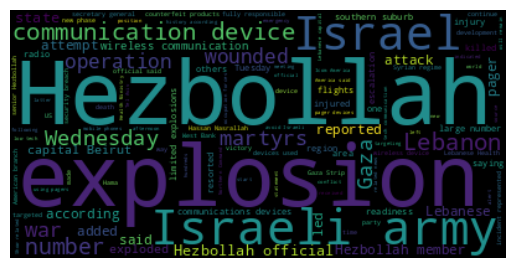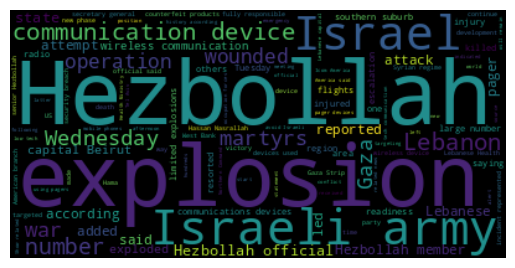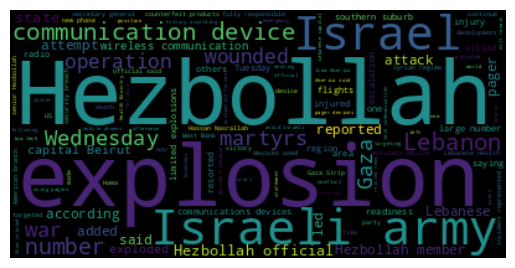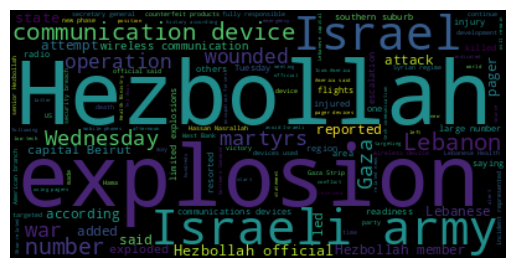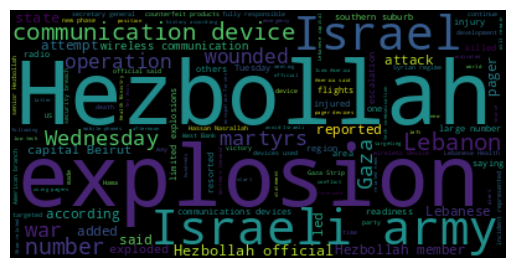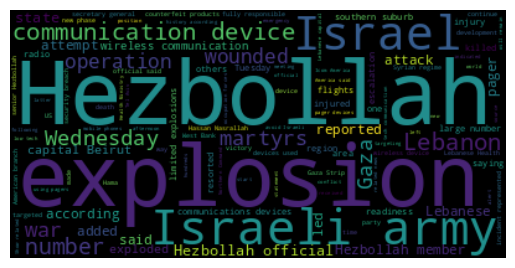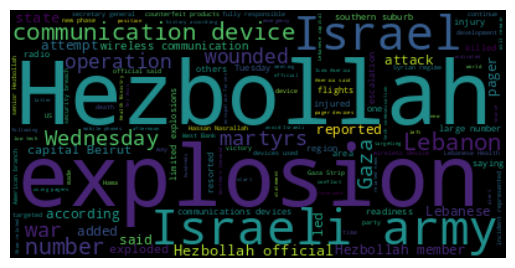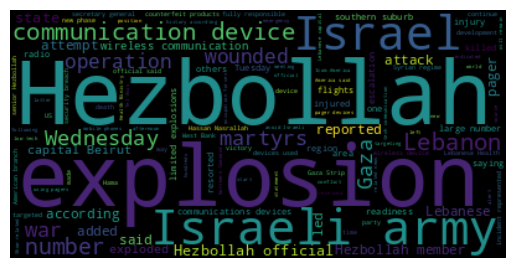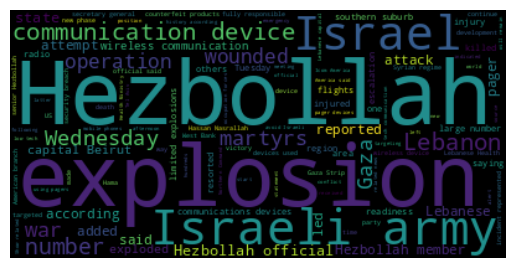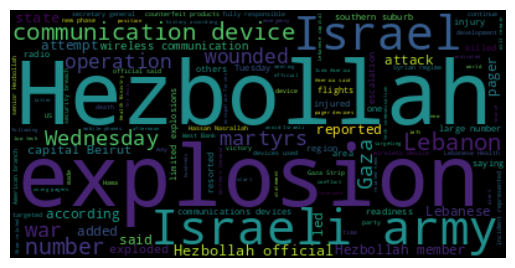
HEADLINES:
Apples
Peaches
Pears
Plumbs
ARTICLE SUMMARY (2024-09-23)
Show related newsHusayni scholars who ascended on the path to Jerusalem..😢- His Eminence Ayatollah Sheikh Abdul-Moneim Mahna- His Eminence Sheikh Ali Abu Rayya- His Eminence Sayyed Muhammad Salih- His Eminence Sheikh Amin Saad pic.twitter.com/DUAoWC99li — abu ali al-Dirani (@abualihussein19) September 23, 2024You will be missed by the preaching arenas in all parts of the world, but your plant will grow, where you stood, and where you succeeded in spreading the religion and the name of Hussein (peace be upon him)… #Happy_Sheikh_Ali_Abu_Riya pic.twitter.com/hN6zQF9aRf — Hassan Ali Shehazi (@Hsn_Shehazi) September 23, 2024Four Shiite religious scholars were martyred as a result of the brutal Israeli aggression that targeted areas in southern Lebanon on Monday. Lebanese media mourned, "Sheikh Abdul-Moneim Mahna, Sheikh Ali Abu Rayya, Sheikh Muhammad Salih, and Sheikh Amin Saad, who were killed in raids on various areas in southern Lebanon. The Hebrew website "Code Code" claimed, quoting the occupation army, that Muhammad Saleh and Ali Abu Rayya were leaders in Hezbollah. The website reported that they were assassinated when a car carrying them was targeted in southern Lebanon. The aggression on southern Lebanon on Monday resulted in the martyrdom of 356 people, including women and children, with the number of wounded rising to more than a thousand.
ARTICLE SUMMARY (2024-09-23)
The Islamic Group in Lebanon mourned the leader Hussein Al-Nader, who was martyred in an Israeli bombing of his home in the Marjeyoun district in the south of the country. The Islamic Group participated through its military wing, “Fajr Forces,” in the “Al-Aqsa Flood” battle, and presented dozens of martyrs.
ARTICLE SUMMARY (2024-09-23)
White House statement: "The risk of escalation in Lebanon is real, and we continue to believe that a diplomatic solution is possible" The statement stressed the United States’ commitment to "Israel’s steadfast security against all Iranian-backed threats, including Hezbollah" On Monday, Israeli warplanes launched dozens of raids on several areas in southern and eastern Lebanon.
ARTICLE SUMMARY (2024-09-23)
The US Department of Defense announced on Monday that the United States will send a “limited number” of additional troops to the Middle East. The announcement came as fears of a regional war grow, after Israeli aircraft bombed hundreds of targets in Lebanon. Earlier, the White House said that "the risk of escalation in Lebanon is real"
ARTICLE SUMMARY (2024-09-23)
Show related news National solidarity is a moral and political duty at this stage of Lebanon’s history.
Our people in the South, the Bekaa and the suburbs are a trust for all Lebanese and their support comes before any consideration.
— Saad Hariri (@saadhariri) September 23, 2024 Former Lebanese Prime Minister and leader of the Future Movement, Saad Hariri, called for standing with the people of southern Lebanon, which is being subjected to a brutal Israeli aggression. Hariri published a tweet on the “X” platform, in which he said that “national solidarity is a moral and political duty at this stage in Lebanon’s history.” He added: “Our people in the south, the Bekaa, and the suburbs are a trust for all Lebanese, and their support comes before any consideration.” This solidarity is the first of its kind by the Sunni Lebanese leader since Hezbollah’s participation in the battle against the Israeli occupation. Hariri is Hezbollah’s most prominent opponent in Lebanon, and has engaged in sharp skirmishes and disagreements with the party and its supporters over the past years. It is noteworthy that the Israeli aggression on southern Lebanon left about 500 martyrs and more than 1,600 wounded in less than 24 hours.
ARTICLE SUMMARY (2024-09-23)
Even if it turns out that Taiwan was not involved in the attack, its military cooperation with Israel dates back at least half a century.
Taiwan was quick to condemn Operation Protective Edge on October 7, and donated more than half a million US dollars to fund services for Israeli soldiers and their families.
With the help of the US-based “China lobby,” Taiwan’s unelected Kuomintang settlers held their seat at the United Nations until 1971, on the eve of the US normalization of relations with the People’s Republic of China in 1972.
In fact, from 1965 to 1971, the United States and Israel consistently voted against the proposal to expel Taiwan and replace it with the People’s Republic of China at the United Nations.
There were also press reports that Israel transferred nuclear and chemical warfare technology to Taiwan, as well as intelligence training.
ARTICLE SUMMARY (2024-09-24)
Hebrew media reported a direct hit on a building in northern occupied Palestine as a result of the missile bombardment from Lebanon. Israeli occupation army’s Home Front Command said that air raid sirens are sounding again in several areas in the north of the territories. Lebanese media reported that the occupation’s air force bombed the vicinity of the town of Douir, Nabatieh District, and theTown of Maaroub.
ARTICLE SUMMARY (2024-09-23)
Israeli media reported that the target of the new Israeli raid on the southern suburb of the Lebanese capital Beirut was the third man in Hezbollah, Ali Karaki. Karaki is believed to be a member of the Jihad Council For Hezbollah, and the commander of the party’s southern region.
ARTICLE SUMMARY (2024-09-23)
Nearly 500 Lebanese, including dozens of children and women, were killed on Monday in the most violent Israeli raids on Lebanon since October 2023. Last month, the Speaker of the Lebanese Parliament, Nabih Berri, said that Lebanon does not want war, but is ready to defend itself if attacked.
ARTICLE SUMMARY (2024-09-23)
Nearly 500 Lebanese, including dozens of children and women, were killed on Monday in the most violent Israeli raids on Lebanon since October 2023. Last month, the Speaker of the Lebanese Parliament, Nabih Berri, said that Lebanon does not want war, but is ready to defend itself if attacked.
ARTICLE SUMMARY (2024-09-23)
Lebanese Ministry of Health reports 356 martyrs and 1,246 injuries as a result of Israeli raids on southern and eastern Lebanon. The Israeli occupation army said that it bombed about 800 targets linked to Hezbollah in southern Lebanon and the Bekaa Valley region on Monday.
ARTICLE SUMMARY (2024-09-23)
The Israeli occupation army announced, on Monday evening, the expansion of its military operations, and the bombing of a number of sites in the Lebanese capital Beirut. The army said that it bombed about 1,300 targets linked to the Hezbollah group in southern Lebanon and the Bekaa Valley region on Monday.
